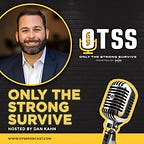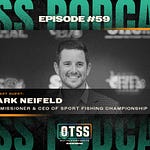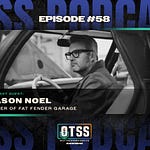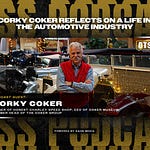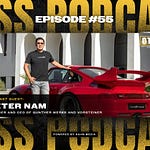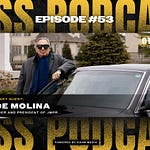Phillip Griot of Griot’s Motors on “Only The Strong Survive”
Phillip Griot’s life and work both revolve around a passion for cars inherited from his father, Richard. As a child, Phillip got tossed into the family’s Chevy Suburban for long road trips with his dad at the helm. On those cross-country journeys, Phillip began to appreciate the many idiosyncrasies of early cars and their bonding power. During his teenage years, Phillip spent much of his youth helping his dad maintain and preserve the elder Griot’s ever-expanding collection of automobiles. Eventually, his dad’s car collection grew so large that a larger facility and professionals were needed to maintain it.
As the scope of Richard’s collection grew, so did the team's capabilities surrounding it. They were now performing extensive restorations, custom fabrication and high-quality paintwork. When other people began asking for help restoring their cars, Phillip saw an opportunity and launched Griot’s Motors. Now, the business is well-known as a first-rate restorer of exotic and classic cars, along with providing storage and assisting in their sales.
Launching and running a business has taught Phillip a lot about entrepreneurship. In this latest episode of “Only The Strong Survive,” he discusses with host Dan Kahn what it took to get Griot’s Motors off the ground and the lessons he learned along the way. Click on the link above to listen to the full episode, and here are our top five takeaways:
Adaptation is the key to a thriving business.
You need a way to separate yourself from the competition.
Don’t be afraid (or too proud) to ask an expert for help.
Brands should always focus on their customers.
Hire someone strong in the areas where you are weak.
You Have to Adapt to Survive
Griot’s Motors has existed informally in the back of the family business, Griot’s Garage, since 2008. However, the official launch of Griot’s Motors happened right before a global pandemic became a reality. The timing might have seemed problematic, but Phillip quickly learned that being able to pivot rapidly is vital to any successful business.
“It (the pandemic) did make us go back to the whiteboard on how we were planning on doing things,” said Phillip. “We were very lucky to be new in the industry and agile without concrete opinions on how business was supposed to be done. Also, we were willing to learn and adapt to what was a quickly changing marketplace.”
Separate Yourself from the Competition
There are a lot of talented car restorers, builders and fabricators out there. However, some don’t have the best business sense. Vehicles might get shoved into the back of the shop, deadlines blown and you have to chase them down for updates. Phillip focused on running Griot’s Motors as a professional business to differentiate it from those “types” of shops.
“I think I was lucky to grow up with a lot of great businessmen. My grandpa was a great businessman; my dad is a great businessman,” says Phillip. “I read a lot of books in the planning stages. I think I read ‘E-Myth’ about six times. It focuses on processes above all.”
Call in the Experts When Needed
One unique aspect of Griot’s Motors is that it doesn’t work with only one brand of cars. This gives Griot’s Motors a wider range of customers and insulates it from market trends. However, the key to making this work is not having a big ego and being able to call on a trusted network of experts for help when needed.
“We have done a ton of Porsches, so we have a lot of Porsche expertise,” says Phillip. “However, should we find a Porsche-specific problem where we need a Porsche-specific answer from an expert, we have a Rolodex full of them. We have great relationships with all of these people. I will pay to send them out, walk around the car and diagnose these questions that we don’t have answers to. We won’t make up answers.”
Simplifying Your Customers’ Lives is a Priority
Getting lost in the daily grind of running a business is easy. However, losing focus on your customers is a surefire way to lose them. Regardless of the type of business, solving your customers' problems to make their lives easier should always be a priority.
“We are trying to simplify the life of the client who only really wants to have fun. The understanding of the contract and the transaction is that this is someone who has enough money to pay us because they don’t have the time to do it themselves,” says Phillip. “We appreciate that, and our goal is not to waste their time. Instead, we want to give them exactly what they want to enjoy their car in whatever way they see fit.”
Know Your Strengths and Weaknesses
To run a successful business, you need to be absolutely honest with yourself about your own strengths and weaknesses. Doing so is not about setting out on a mushy self-healing journey or a path of enlightenment. Instead, it allows you to hire the right people who can strengthen the areas in which you are weak.
“Know what your strengths and weaknesses are and then compensate someone well to cover your weaknesses,” says Phillip. “After five years, I know what I am not good at better than what I am good at. I don’t do those things anymore because that is what leads to folly. So, that is the biggest lesson I have learned. It is not from failing once but from stubbornly believing I could figure everything out.”


